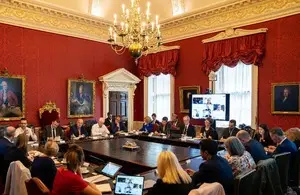Deputy Prime Minister Angela Rayner met with business leaders and trade unions to discuss workplace reforms. The meeting, held on 14th August 2024, marked a significant step towards enhancing collaboration and respect between the parties.
New Era of Partnership
In a groundbreaking meeting, Deputy Prime Minister Angela Rayner emphasised the beginning of ‘a new era of partnership’ between businesses and unions. The discussions aimed to create a collaborative environment to improve workplace conditions and economic growth. Rayner expressed her commitment to listening and incorporating feedback from all stakeholders involved.
This meeting saw the participation of key representatives from various sectors, all agreeing to ‘wipe the slate clean and begin a new relationship of respect and collaboration’. The collective goal is to deliver Labour’s plan for economic growth through enhanced cooperation and mutual understanding.
Focus on Employment Rights Bill
The Employment Rights Bill was a focal point of the meeting. Rayner and Business Secretary Jonathan Reynolds engaged in detailed discussions about the bill’s impact on workers and employers. A significant highlight was the plan to ban exploitative zero-hours contracts and end the controversial practice of ‘fire and rehire’.
Other provisions in the bill include introducing basic rights from day one, such as parental leave, sick pay, and protection from unfair dismissal. The bill also aims to strengthen the collective voice of workers through trade unions and create a Single Enforcement Body to uphold employment rights.
Make Work Pay Plan
Rayner outlined Labour’s Plan to Make Work Pay, which includes major reforms to ensure fair wages and better working conditions. A key component is changing the remit of the Low Pay Commission to account for the cost of living, ensuring the minimum wage is a genuine living wage.
The plan also aims to remove discriminatory age bands, making all adults eligible for the same minimum wage. This shift is expected to provide a much-needed boost to workers’ financial stability and overall quality of life.
The Labour government’s approach is to deliver these changes within the first 100 days of their tenure, showcasing their dedication to rapidly implementing these crucial reforms.
Business and Trade Union Feedback
Business Secretary Jonathan Reynolds acknowledged the importance of incorporating insights from both businesses and trade unions. He stressed that their perspectives are vital in shaping government ambitions, including the Plan to Make Work Pay, to enhance economic growth and create better working conditions.
Trade union leaders, including representatives from GMB, TUC, and UNISON, expressed their optimism about the reforms. TUC General Secretary Paul Nowak highlighted the significance of this meeting for discussing shared gains and anticipated close working relationships moving forward.
Representation from Various Sectors
The meeting saw extensive representation from both business leaders and trade unions. Organisations such as the British Chambers of Commerce (BCC), Confederation of British Industry (CBI), and Institute of Directors (IoD) were present, ensuring a diverse range of perspectives.
Trade unions included USDAW, Unite, and Prospect, among others. Their participation underscored the collective effort to address workplace issues comprehensively and constructively.
Jonathan Geldart, Director General of the IoD, described the meeting as an ‘important first step in ensuring that there is meaningful dialogue with business’. He also pointed out the need for detailed engagement to minimise any risks of unintended consequences from the reforms.
Commitment to Early Progress
Since the election in July, Labour has focused on overhauling the remit of the Low Pay Commission to deliver early progress on the Make Work Pay plan. The King’s Speech included commitments to these reforms, reflecting the government’s urgency in addressing employment issues.
Rayner and Reynolds reaffirmed their dedication to introducing the Employment Rights Bill within the first 100 days of their administration. This fast-track approach aims to ensure that workers benefit from improved conditions and rights as soon as possible.
Conclusion of the Meeting
The meeting concluded with a mutual agreement to continue these discussions and work collaboratively towards the shared goal of economic growth and better working conditions.
All parties involved recognised the importance of maintaining open lines of communication and fostering mutual respect to achieve these reforms effectively.
The meeting between businesses, trade unions, and Deputy Prime Minister Angela Rayner marks a promising step towards collaborative workplace reforms. The commitment to improving conditions and economic growth is evident, and the ongoing dialogue is expected to yield significant benefits for workers and employers alike.
With a clear plan and the involvement of key stakeholders, the Labour government is poised to deliver the promised reforms swiftly. The emphasis on mutual respect and collaboration bodes well for the future of workplace relations in the UK.

